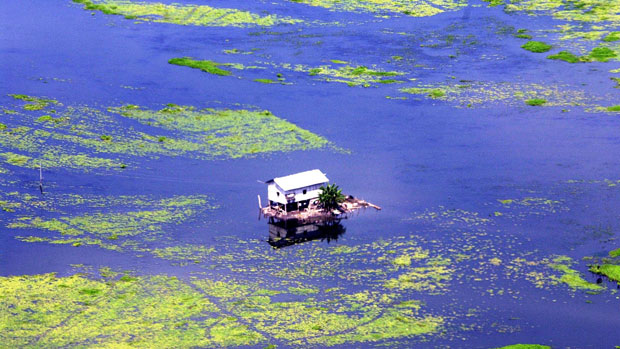El Nino: what is it and why might this year's be the 'worst ever'?
The complex El Nino phenomenon will potentially bring a harsher winter in Europe

A free daily email with the biggest news stories of the day – and the best features from TheWeek.com
You are now subscribed
Your newsletter sign-up was successful
Meteorologists are predicting that this year's El Nino event might be the most significant on record and is likely to lead to extreme weather events around the world.
The World Meteorological Organisation (WMO) says El Nino, which is already underway, is strengthening and will peak by the end of this year – potentially causing a colder winter in Europe.
The strongest El Nino on record was in 1997-8 and scientists say sea temperatures in parts of the Pacific are now at levels not seen since the late 1990s.
The Week
Escape your echo chamber. Get the facts behind the news, plus analysis from multiple perspectives.

Sign up for The Week's Free Newsletters
From our morning news briefing to a weekly Good News Newsletter, get the best of The Week delivered directly to your inbox.
From our morning news briefing to a weekly Good News Newsletter, get the best of The Week delivered directly to your inbox.
So what is El Nino and what causes it?
El Nino occurs when temperatures in the Pacific Ocean rise due to a change in the normal wind direction, which causes extreme weather patterns across the world. While it is a naturally occurring event, scientists believe that greenhouse gases and subsequent global warming are intensifying its effects, as the number of El Nino events has increased noticeably in the last few decades. The phenomenon typically lasts up to a year and is part of a complex cycle involving the ocean and the atmosphere which occurs every two to seven years. This year, meteorologists say the surface water temperatures in the east-central tropical Pacific Ocean are likely to exceed 2C above average, "potentially placing this El Nino event among the four strongest events since 1950".
What effect does it have?
El Nino is never exactly the same twice, but it does make certain weather patterns more likely. Australia, Indonesia, and the Philippines typically experience much drier conditions than normal, with droughts, poor harvest and forest fires possible. Monsoons that bring much needed rain to parts of India can become weaker.
A free daily email with the biggest news stories of the day – and the best features from TheWeek.com
In South America, Peru and Ecuador see much heavier rains between January and May, and commercial fishing is often severely affected. "The Peruvian fish industry can be devastated as the change in coastal wind direction prevents nutrient rich water rising leading to huge losses," the Met Office's Adam Scaife told the Daily Mirror.
The United States normally experiences fewer hurricanes but wetter weather becomes more likely in the south during autumn and winter. The warm Pacific air often causes more intense typhoons in Japan and South Korea. "There is also some evidence that El Nino can encourage colder weather in Europe," says BBC meteorologist Chris Fawkes. "It was partly to blame for the very severe winter of 2009, the UK's coldest for decades."
In 1876, the extreme weather caused by El Nino led to the most deadly global famine of the 19th Century. "The combination of extreme droughts and monsoons led to millions of deaths under hellish conditions," wrote historian Cormac O Grada in his 2010 book Famine: A Short History.
-
 The environmental cost of GLP-1s
The environmental cost of GLP-1sThe explainer Producing the drugs is a dirty process
-
 Greenland’s capital becomes ground zero for the country’s diplomatic straits
Greenland’s capital becomes ground zero for the country’s diplomatic straitsIN THE SPOTLIGHT A flurry of new consular activity in Nuuk shows how important Greenland has become to Europeans’ anxiety about American imperialism
-
 ‘This is something that happens all too often’
‘This is something that happens all too often’Instant Opinion Opinion, comment and editorials of the day
-
 Epstein files topple law CEO, roil UK government
Epstein files topple law CEO, roil UK governmentSpeed Read Peter Mandelson, Britain’s former ambassador to the US, is caught up in the scandal
-
 Iran and US prepare to meet after skirmishes
Iran and US prepare to meet after skirmishesSpeed Read The incident comes amid heightened tensions in the Middle East
-
 Israel retrieves final hostage’s body from Gaza
Israel retrieves final hostage’s body from GazaSpeed Read The 24-year-old police officer was killed during the initial Hamas attack
-
 China’s Xi targets top general in growing purge
China’s Xi targets top general in growing purgeSpeed Read Zhang Youxia is being investigated over ‘grave violations’ of the law
-
 Panama and Canada are negotiating over a crucial copper mine
Panama and Canada are negotiating over a crucial copper mineIn the Spotlight Panama is set to make a final decision on the mine this summer
-
 Why Greenland’s natural resources are nearly impossible to mine
Why Greenland’s natural resources are nearly impossible to mineThe Explainer The country’s natural landscape makes the task extremely difficult
-
 Iran cuts internet as protests escalate
Iran cuts internet as protests escalateSpeed Reada Government buildings across the country have been set on fire
-
 US nabs ‘shadow’ tanker claimed by Russia
US nabs ‘shadow’ tanker claimed by RussiaSpeed Read The ship was one of two vessels seized by the US military